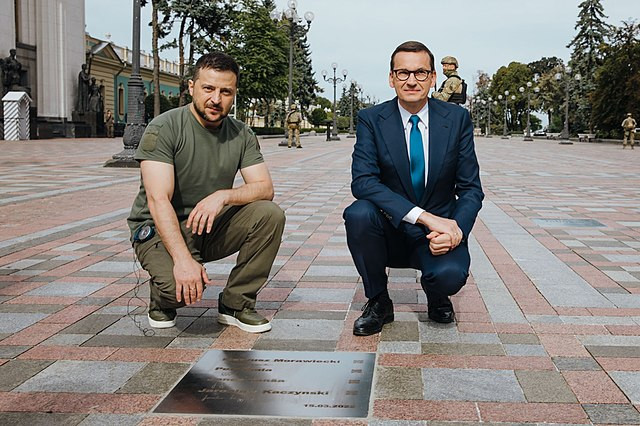Tensions between Poland and Ukraine have intensified over food export issues, leading Polish Prime Minister Mateusz Morawiecki to recently suggest that Poland might cease supplying weapons to Ukraine.
A Misunderstood Statement?
According to Xinhua News Agency, Morawiecki stated on social media that Poland would no longer transfer weapons to Ukraine, emphasizing the need to arm Poland with more modern weaponry. However, Polish President Andrzej Duda later clarified that Morawiecki had been "misunderstood in the worst possible way," explaining that Poland would simply not provide Ukraine with its latest weapons. Government spokesperson Piotr Müller further clarified that Poland would only deliver previously agreed-upon ammunition and military equipment.
Poland has been a significant supporter of Ukraine, especially during the onset of the Ukrainian crisis, supplying a substantial amount of weaponry. Reports indicate that Poland has provided over 200 Soviet-style tanks and several MiG-29 fighter jets, depleting about a third of its military equipment. Polish authorities have stated they are replenishing their arsenal with more modern equipment.
The Root of the Dispute: Food Exports
Ukraine, often referred to as the "breadbasket of Europe," exports more than 10% of the world's corn and wheat. Since the Ukrainian crisis began, its food exports have faced significant challenges. Even after Russia and Ukraine signed the Black Sea Grain Agreement in July 2022 under UN mediation, Ukrainian grain exports struggled to recover, leading to massive backlogs.
This surplus, initially intended for global markets, accumulated in Eastern European countries due to transportation disruptions. As a result, large quantities of cheap Ukrainian grain flooded countries like Poland. Estimates suggest that the influx of inexpensive Ukrainian grain has caused a loss of around 500 billion euros for farmers in other Eastern European nations.
In April, the Polish government decided to ban the import of grain and other foods from Ukraine to protect its agriculture. In May, the European Commission banned the export of certain Ukrainian agricultural products to five EU countries, including Poland. However, in September, the EU lifted the ban, but Hungary, Poland, and Slovakia unilaterally extended their bans on Ukrainian grain imports. In response, Ukraine filed a lawsuit with the World Trade Organization.
Ukrainian President Volodymyr Zelensky sharply criticized these countries at the United Nations General Assembly. The Ukrainian Prime Minister also warned on social media that if Poland and Hungary did not lift their bans, Ukraine would impose restrictions on certain agricultural products from these countries, including Polish apples. Ukraine is the fourth-largest importer of Polish apples.
In retaliation, Morawiecki announced the halt in weapon supplies to Ukraine. This decision might be influenced by the upcoming national elections in Poland. With rising public sentiment in Poland favoring protective measures for local farmers, the ruling Law and Justice Party, to which Morawiecki belongs, feels the pressure to take a tougher stance against Ukraine.
As of August this year, Poland has provided military assistance worth $3.3 billion to Ukraine, ranking sixth globally, following the U.S., Germany, the U.K., Norway, and Denmark.
The U.S., which has been continuously supplying ammunition to Ukraine, is nearing its stockpile limits. U.S. National Security Advisor Jake Sullivan mentioned that it would take years to produce the required amount of ammunition, while U.S. Defense Secretary Lloyd Austin stated that the heavy weapon usage by Ukraine and Russia has put significant pressure on the global ammunition and artillery supply. With a global weapon shortage looming, Ukraine's weapon reserves could be impacted if it loses Poland's support.





